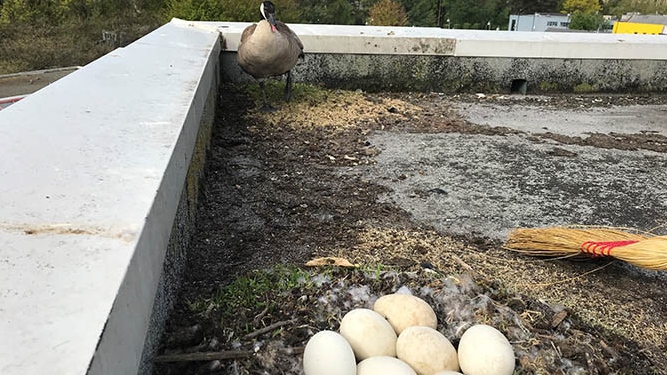How Vancouver's park board controls the Canada goose population, and what you can do to help
 A Canada goose and its nest on a rooftop is seen in this undated image. (City of Vancouver)
A Canada goose and its nest on a rooftop is seen in this undated image. (City of Vancouver)
From digging up lawns, to displaying "aggressive" mating behaviour, to defecating on memorial benches, Vancouver's Park Board is reminding residents of some of the problems that come with a booming population of Canada geese.
On Tuesday, the board asked city residents to be on the lookout for nests and to stop feeding the birds in order to help efforts to control the population.
While the board notes gaggles of geese tend to congregate where "grassy clearings meet the shoreline" in places like Stanley Park and False Creek, they actually build their nests "far above the ground." Popular spots include treetops, roofs and balconies.
"A single goose standing in the same spot day-on-day is a strong indicator that a nest may be nearby, "says a statement from the park board.
Once nesting spots have been identified, people are encouraged to report them to the city so park board staff can attend and "addle" the eggs.
"Addling involves replacing viable eggs with eggs that have been pre-treated so that they will not hatch," the statement explains, adding this approach is one approved by animal welfare organizations like the BC SPCA.
Feeding geese is punishable with a fine of up to $500. But that's not the only reason the board says the public absolutely should not do it. Feeding encourages geese to congregate where they know there will be food. The more geese eat, the more waste will to pile up in parks and other public places.
"As Canada geese produce more excrement for their size and the amount that they eat than most species, that also presents a serious challenge to cleaning up after them," the board explains.
Beyond this rather crappy consequence, overfeeding also makes it possible for geese to lay more than one "clutch" of eight eggs per season.
"In nature, without food from humans, this wouldn’t happen," the board's statement says.
Nests can be reported online, by calling 311 or by emailing geese@vancouver.ca. Anyone who witnesses people feeding wildlife of any kind is also urged to report it by calling 311.
CTVNews.ca Top Stories

W5 Investigates A 'ticking time bomb': Inside Syria's toughest prison holding accused high-ranking ISIS members
In the last of a three-part investigation, W5's Avery Haines was given rare access to a Syrian prison, where thousands of accused high-ranking ISIS members are being held.
Trudeau Liberals' two-month GST holiday bill passes the House, off to the Senate
The federal government's five-page piece of legislation to enact Prime Minister Justin Trudeau's promised two-month tax break on a range of consumer goods over the holidays passed in the House of Commons late Thursday.
Irregular sleep patterns may raise risk of heart attack and stroke, study suggests
Sleeping and waking up at different times is associated with an increased risk of heart attack and stroke, even for people who get the recommended amount of sleep, according to new research.
California man who went missing for 25 years found after sister sees his picture in the news
It’s a Thanksgiving miracle for one California family after a man who went missing in 1999 was found 25 years later when his sister saw a photo of him in an online article, authorities said.
As Australia bans social media for children, Quebec is paying close attention
As Australia moves to ban social media for children under 16, Quebec is debating whether to follow suit.
Notre Dame Cathedral: Sneak peek ahead of the reopening
After more than five years of frenetic reconstruction work, Notre Dame Cathedral showed its new self to the world Friday, with rebuilt soaring ceilings and creamy good-as-new stonework erasing somber memories of its devastating fire in 2019.
Canada Post temporarily laying off striking workers, union says
The union representing Canada Post workers says the Crown corporation has been laying off striking employees as the labour action by more than 55,000 workers approaches the two-week mark.
Can't resist Black Friday weekend deals? How to shop while staying within your budget
A budgeting expert says there are a number of ways shoppers can avoid getting enveloped by the sales frenzy and resist spending beyond their means.
Montreal shopping mall playing 'Baby Shark' song to prevent unhoused from loitering
A shopping mall and office complex in downtown Montreal is being criticized for using the popular children's song 'Baby Shark' to discourage unhoused people from loitering in its emergency exit stairwells.

































